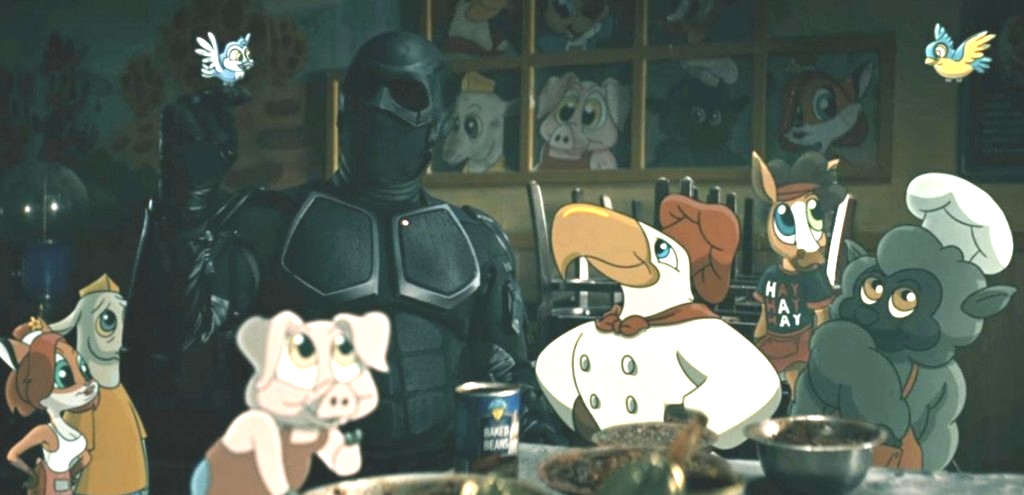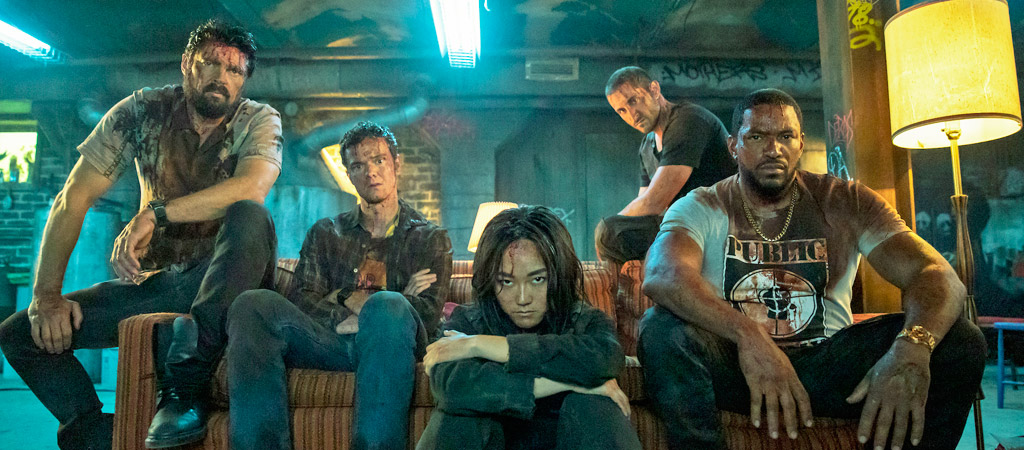The Boys‘ very first scene began with a great trauma — Hughie stood outside with his lady love, Robin; A-Train zoomed by and pulverized her; Hughie was left holding her detached and bloodied hands, ain’t that romance? — and charged straight into amplified mayhem and raunchiness galore. Amid that chaos, the show’s digging deep into great characterization, and two backstories are finally coming to the forefront in Season 3. All of this is making me reflect back upon what Slipknot’s Corey Taylor (speaking about the band’s “Solway Firth” making a first-season video tie-in) told us about Season 1:
“[W]ith Butcher’s character in there, the catastrophe that happens with him, the catastrophe that happens with Hughie, the fact that there is a real hatred that develops for the abusers, towards the abusers. And that’s reflected in that song. It is your moment to spit back in the face of the people who have taken advantage of you and abused you and harmed you and controlled you.”
Three seasons into this show, and I’m chuckling about how, prior to The Boys launch, the comic book-movie-loving TV audience endured a more innocent time. There was definitely something lacking, given that fans couldn’t forever make do with jokes about Captain America being the Language Police of the MCU while Zack Snyder attempted the “dark and gritty” thing with DC/Warner Bros. Yet The Boys (as those rarely successful satires tend to do) blew all of that out of the water. After one season, the show went weekly, which made some people very angry, but the episode-by-episode “digestion” phase also brought some stunning character rollouts. And those developments are much more impactful (and insightful) when absorbed weekly.
One major example of this: Antony Starr’s raunchy rooftop solo act landed as much more than a jerk-off session, and Starr has subsequently veered further into a terrifyingly layered performance. The show’s weekly pacing has allowed for the incremental reveal of exactly how flailingly desperate he is for true connection (even if he arguably isn’t capable of it), and as the show still follows Hughie, he’s obviously not handling his traumatic sh*t well by putting as much Compound V into his veins as possible.
Yet there are two more profound backstories now rising in Season 3. These stories provide the perfect opportunity to talk about how this show piles on the comically disgusting moments like no one else’s business, but showrunner Eric Kripke does not forget that the whole project is rooted in catastrophe and trauma. One story, in particular, resonates with me as an anxious person. I’m talking about Mother’s Milk (Laz Alonso), who differs from the comics (where he literally got Supe powers in utero from his mother) and whose backstory (on the show) remained murky until this season. He’s also (and this has been alluded to plenty before now) nursing some hefty anxiety that manifests itself in obsessive-compulsive disorder, and this season, we find out why that’s the case.
Now, I’m not going to go into DSM-5 depths of OCD here, but let’s just say that the show worked out how to have (appropriate) fun with this affliction, too, and it does so in a way that’s consistent with the spirit of the show. Poor Mother’s Milk is not only obsessed with keeping things orderly, but he’s also the guy who got attacked by Love Sausage last season, and — this had to happen to someone — he had the worst time during the “Herogasm” episode. Not only did the Ant-Man-sex guy ruin MM’s jacket, but then another hero really ruined it. This Twitter reaction says it all.
I would just kill myself to be honest.#TheBoysTV #Herogasm pic.twitter.com/GRWEJV3btY
— Nazo (@NazoXIII) June 24, 2022
Not only is there an unspoken “Father’s Milk” joke in there, but this horror would be more horrific to an OCD sufferer (who’s prone feeling immense anxiety about disorder and/or having germaphobia in the mix) than anyone else. And the miraculous thing is that The Boys is roasting this affliction, something that can really affect one’s quality of life, and it actually works. It’s funny (and I can say that, having experienced with the disorder), but the origins of MM’s OCD are much more serious. In fact, he’s arguably got the most tragic backstory in all of The Boys (the show and the group).
As this season informs us, MM feels pure hatred toward Soldier Boy while Butcher and Hughie are keen to recruit him to take down Homelander. That hatred is perfectly justified, given that Soldier Boy killed members of MM’s family. And that’s what sparked the OCD, as MM described while speaking of his compulsion to check the stove burners over and over again, out of fear that Soldier Boy will come back and keep killing his family. As MM phrases things, “I gotta get this motherf*cker out of my head,” but as we see leading up to the finale, Butcher shuts down the realization of that vengeance. Yet all scenarios are on the table for the season’s ending.
In addition to MM’s story, this season’s also been filling us in on Black Noir. He is, of course, the completely silent, never-unmasked ninja who received the backstory that we never knew we needed. Imaginary friends!

My goodness, the show’s leaping to such creative heights this season, after putting Kimiko and Frenchie into a musical scene, and now, we’re meeting Black Noir’s imaginary cadre of animated best friends. It’s a little bit Snow White (with some Roger Rabbit), and these creatures (who have apparently been keeping him company for the entire show) told the audience why Black Noir cut and ran from The Seven after hearing of Soldier Boys’ unfrozen-hero arrival. That realization upset Black Noir enough that he ripped the tracker out of his arm and left the tower. There’s a deep fear and trauma there that no one realized existed, and the way that The Boys introduced this was stunning and perhaps the only believable way that Noir’s backstory could be told.
Those cartoon characters told Noir’s backstory in a way that stayed consistent with the character, but Noir did not passively sit by and listen. Instead, Nathan Mitchell acted the hell out of these scenes without showing us a facial expression or uttering a word. Sure, there was a sigh here and there, but the heavy lifting came from Mitchell’s body language. And we learned why he feared Soldier Boy, given that Noir was once part of Payback, which worked together to put Soldier Boy down, given that he’s an awful, jingoistic, loathsome Supe. And we don’t know precisely why Noir’s mind is inhabited by these animated creatures, but there are clearly some serious layers at work.
Where those layers go, we may soon find out in the season finale. Soldier Boy’s arrival stirred up much of what we learned about both MM and Noir this season, and there’s surely more to come this week, given the emotional heft of both their backstories. Yet what I’m very much appreciating is how The Boys is not only committed to giving us all of the unbelievable scenarios when it comes to the show’s outrageousness, but the essences and motivations of these characters always feel believable through the show’s writing. Like I said earlier, The Boys was born from trauma, and it never let up. There’s no reason to believe that the show’s traumatized characters will ease their pain, but at least we know that the show will do their stories justice. The season finale’s a satisfying one, too, so gather ’round to see how everyone will deal with the Soldier Boy problem.
Amazon’s ‘The Boys’ releases new episodes on Fridays.







